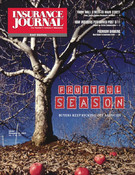The ongoing investigation of brokerage commissions and alleged bid rigging that started in New York is being felt everywhere, nowhere more so than neighboring Connecticut.
Despite an agenda that ranged from identity theft to best practices in agency management, the brokerage probe was what had attendees at the recent Independent Insurance Agents of Connecticut (IIAC) mid-year meeting in Southington talking.
IIAC leaders at the gathering were fresh from a meeting a day earlier with Conn. Insurance Commissioner Susan Cogswell, who asked them for input on how best to handle disclosure of agent and broker commissions for clients in the wake of the uproar.
While Cogswell is looking to improve disclosure in cooperation with other states, Nutmeg State Attorney General Richard Blumenthal has subpoenaed dozens of the state’s biggest brokers and insurance companies to determine if any illegal activity has been going on in his state. He’s looking information on contingent commission payments and any evidence of price-fixing.
Main Street agents
In remarks and conversation, agents expressed both dismay at the allegations of illegal activity by large public brokers and concern over how these allegations might affect their own businesses and the image of independent agents.
“We are Main Street agents. This problem was created on Wall Street,” declared Warren C. Ruppar, executive vice president of the IIAC.
“It is important we speak out … so people understand how we are in a different world than the large brokers,” he said.
Ruppar said too many in the public and government do not understand the difference between the giant Wall Street-type insurance brokers who represent big commercial clients and local independent agents who are small business men and women.
He credited the Connecticut Insurance Department for its willingness to speak with local independent agents about the scandal.
Thomas A. Grau, president of the national affiliate, the Independent Insurance Agents & Brokers of America (IIABA), expressed similar concerns about independent agents being lumped in with large brokers and being unfairly “painted with the same brush” as large brokers.
“We’ll do whatever we can to protect our compensation structure,” Grau said.
Grau said officials must be educated about how agents’ profit sharing agreements with their companies differ from the controversial placement service agreements (PSAs) between carriers and brokers.
One agent asked where insurance companies stand on the issue as it affects independent agents, suggesting they might not mind if profit sharing arrangements had to be discontinued.
Ruppar downplayed that notion. “They are part of the negotiations and are very concerned about how the industry and agents are being damaged and are on our side,” he responded.
Grau said the real problem is the alleged illegal activity of bid rigging and price fixing, not agents’ compensation. IIABA adopted a compensation disclosure policy before the scandal broke.
“I have no problem discussing my compensation with any client,” he said. “We’re not ashamed of how we are compensated.”
Agents’ own privacy concerns
But one agent asked if anybody is concerned about the privacy of agents amid the demands that they disclose their profit-sharing agreements and other income sources. “Is anyone protecting agents’ privacy?” he asked.
Ruppar acknowledged that agents’ privacy is a concern and suggested that final disclosure rules may only mean agents will have to tell clients that certain agreements exist, but not expose any details. “The point is to show that it does not affect the sale,” he said.
The privacy concern hit a nerve with another guest at the meeting, state Rep. Lawrence Cafero (R-Norwalk) who warned that what he called the “anti-business” climate in the state legislature did not bode well for fair treatment of agents unless they get more politically involved. The deputy Republican leader of the House said unfortunately too many public officials in Hartford see all businesses in the negative light of the Tyco and Enron affairs. He suspected that every agent has some “resentment” over the allegations of wrongdoing.
“The quality of your life is being affected by what goes on in Hartford. “They want to look into your agency’s books. They want to look into your pockets,” Cafero said. “That’s not America. That’s not Connecticut.”
He urged agents to communicate directly with their elected representatives on a regular basis to help improve legislators’ understanding of how important independent agents are. “Ten calls is like a landslide to a local politician,” he reminded them. “You agents are more politically powerful than you think … I beg you to be aware and hold us accountable.”
Grau said he and the IIABA are concerned that some will use the scandal to push for federal regulation of the business. But federal regulation is not the answer, he stressed, explaining how IIABA “wants to preserve the structure of state regulation” and see it “modernized,” adding, “We don’t need to throw the baby out with the bath water.”
Defends state regulation
On hand to defend state regulation was Kate Kiernan-Pagani, legislative liaison for the Connecticut Insurance Department, representing Commissioner Cogswell, who was ill. “I want to make it clear that the insurance department is not going to tolerate any wrongdoing,” she said, referring to the brokerage controversy.
Kiernan-Pagani said the agency is meeting “proactively with all stakeholders” including agents so that it can quickly understand what is going on in Connecticut. The department is also working closely with the National Association of Insurance Commissioners (NAIC). Cogswell is one of 13 state regulators on a special task force named by NAIC to address the issue.
She acknowledged that while some are trying to use the Spitzer charges to undermine state regulation of insurance, “this should not be taken as a sign of need for federal regulation.” She reminded agents that the scandal was “first discovered by a state” and maintained that the state level is where it can be best investigated and remedied.
Was this article valuable?
Here are more articles you may enjoy.


 Three Charged With Helping Agents Cheat on Florida Insurance License Exams
Three Charged With Helping Agents Cheat on Florida Insurance License Exams  Supreme Court Overturns Chevron Rule in Blow to Regulators
Supreme Court Overturns Chevron Rule in Blow to Regulators  Big ‘I’ Report: Independent Agency Channel Placed 62% of Premiums in 2023
Big ‘I’ Report: Independent Agency Channel Placed 62% of Premiums in 2023  Farmers Adjusters Cry Foul Over Workloads, Claims Handling in Letter to Regulators
Farmers Adjusters Cry Foul Over Workloads, Claims Handling in Letter to Regulators 


